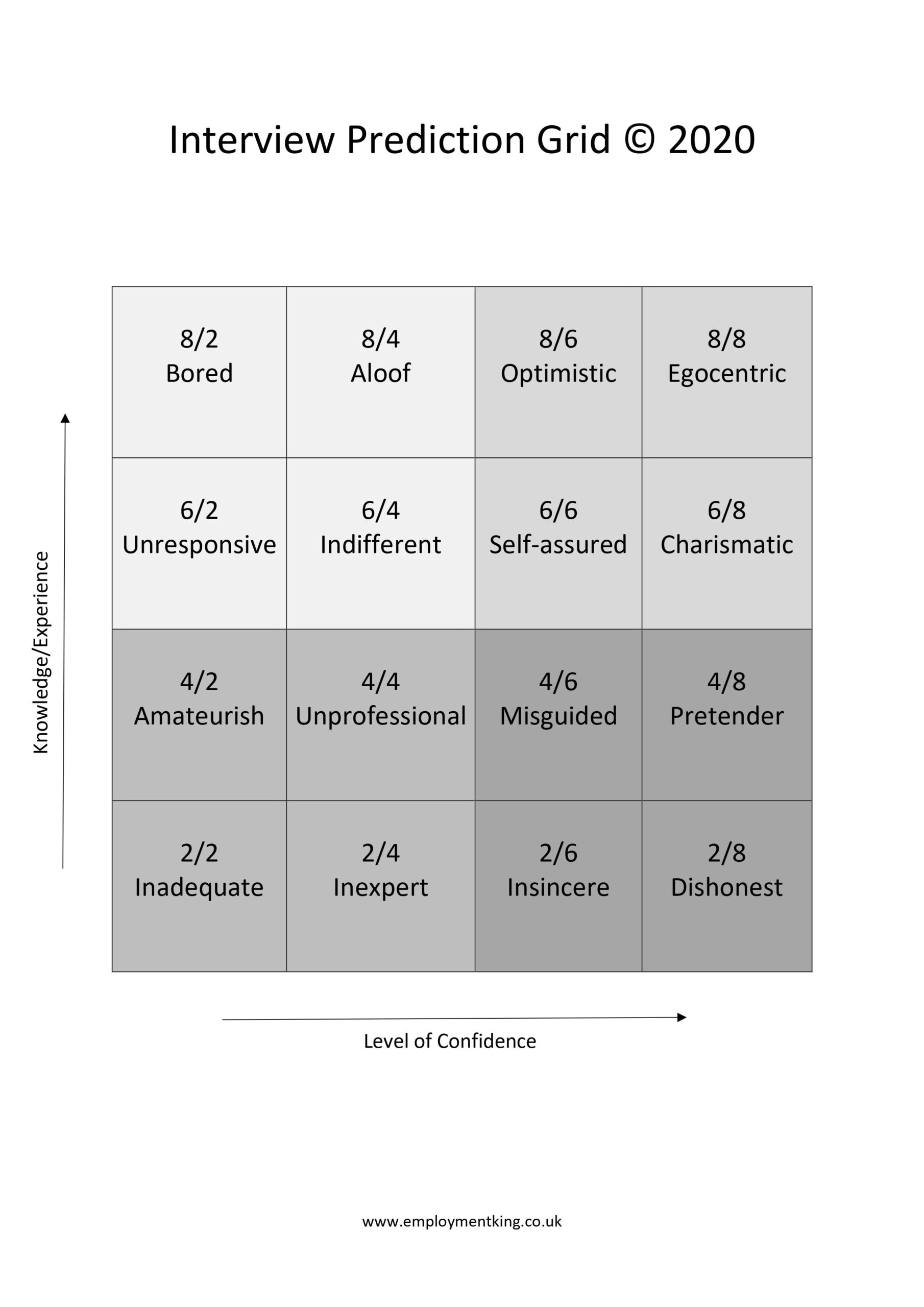Congratulations on completing the Interview Prediction Grid Test (IPG) ©2020.
Below is a breakdown of your Interview Identity
8/8 – Egocentric
Possessing the highest level of knowledge/experience and confidence out of all of the sixteen identities doesn’t result in consistent success.
With, on average, more than 10+ years’ industry experience and possessing a specialist skill set, egocentric applicants are in demand. It is an overconfident belief in their own ability (which is likely to be true) which can come across as domineering.
In fact, 8/8 – Egocentrics truly believe they are more skilled than other interviewees, and often the interviewers themselves. Any opportunity to showcase the expertise will be taken. Self-presentation, though, can end with the applicant arguing over a minor point with the employer.
On paper egocentric interviewees are the most suitable applicants. Extensive experience working on specialist projects has given them a unique insight that can lead to them contributing significantly to the field. Qualified to the highest level, along with an assertive and professional attitude, they constantly build upon industry theories and models, often leading the way.
8/8 – Egocentrics, at the extreme, can be narcissistic; they will self-promote which increases a positive job interview outcome, but they won’t back down on a point they have made even when presented with contradictory evidence. In addition, especially for internal positions, the candidates will happily say negative comments about other internal applicants to make themselves look more suitable for the role.
As alluded to previously, decisions are made emotionally, not logically. If purely a logical decision, the 8/8 – Egocentric career professional would, in most cases, be offered the position. As some interviewers feel threatened by the overbearing 8/8 – Egocentric and/or feel annoyed by their self-centred appearance, the emotional judgment of an interviewer plays a large part in the interview scoring process.
Strengths
Self-promotion is not only required in the job interview, it is expected. No other ‘interview identity’ candidates consistently discuss their competencies as regularly as the 8/8 – Egocentric. Their self-identity is one of a high achiever, and rightly so, as they have often accumulated a wealth of sector-related knowledge/experience and are thus viewed as an industry expert.
With strong mental toughness, any negativity from the interviewer washes over the applicants keeping their confidence level consistent throughout the recruitment process.
Often experienced in diverse roles, they are used to high-pressured situations and can remain calm and even enjoy what others would consider a stressful environment. Cold interview techniques wouldn’t rattle their cage. In fact, the egocentric enjoys the challenge of a tricky interview.
With such interviewees being highly motivated, assertive, and open to challenges, employers view the candidate as one who could fit in with, or more likely, lead a team to a successful outcome.
With a high view of self, 8/8 – Egocentric interviewees will make it clear, using self-praise, data sharing, self-promotion, emotional stories, referencing the job criteria, emotional intelligence, that they are the most suitable candidate for the advertised position.
Interviewers are often charmed by the high competent and confident career professional, viewing them as a specialist who could help the organisation achieve its strategic aims.
This identity is further helped by the candidates who will willingly state their unique selling points at every opportunity. An example of this would be at an interview start when an employer asks, “Tell me a little about yourself.” Most interviewees give a generic summary of their work experience, whereas the 8/8 – Egocentric candidate will create intrigue with a relevant boast, “Over the last 20 years I have turned underperforming organisations on the brink of bankruptcy into multi-million pound businesses within a short timeframe.”
Development
Initial impressions are important. The employer, knowing of the applicants’ reputation, is influenced by the halo effect. As these applicants utilise all three rules of a successful interview (identifying the job criteria, being a self-promoter and communicating with confidence), they win over even the hardest of interviewers.
The downside to having excessive self-belief is ‘tunnel vision’. It is the self-absorbed attitude which seeds doubt in the employer’s mind. Their inflated view of their own self-importance distances them from the interviewer.
Disagreements with an expert interviewer can be common even when contradictory evidence has been presented. If egocentrics don’t get their own way, they can take on an aggressive tone.
Candidates need to learn to let-go. And to recognise that the interviewer may also be an industry expert and sector specialist. It is important in a job interview to listen to employers to understand their frame of reference. Emotional intelligence is key. With this insight a better-worded reply can be given that helps rebuild rapport.
Even when the applicant is more experienced than the interviewer, and often the 8/8 – Egocentric candidate has a rare talent that the employer does not possess, behaviour needs to be amended. Egocentrics will often talk down to people they view as low status.

Advice for the job interview
- Don’t dismiss an expert interviewer’s opinion if it doesn’t adhere to your own experiences. Instead debate, and communicate, various viewpoints to be seen as an authority
- Give the employer attention. Don’t get lost in your own self-importance, instead make the interviewer feel important as this increases rapport
- Adjust communication to keep rapport strong. If any disagreements happen, let them go. Be assertive but professional
Research: IPG







